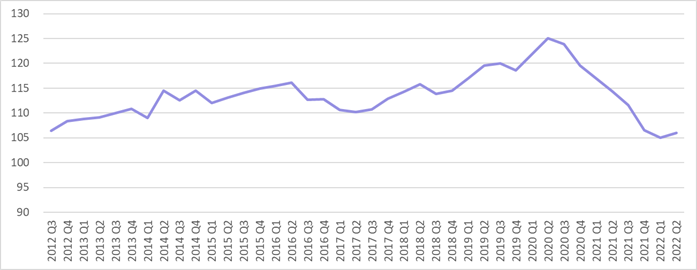The annual National Shelter-SGS Economics & Planning Rental Affordability Index reveals regional NSW housing is less affordable now than at any point in the last decade, challenging the perception that regional NSW is a safe haven for low- and middle-income households.
Rental Affordability Index, Regional NSW

John Engeler, CEO Shelter NSW, said: “For too long, the regions have been viewed with misty eyes as an affordable option for Sydneysiders to retreat to when rents got too high in the city. This is not the case, not for newcomers and certainly not for locals living on local industry wages. Since the pandemic, a growing proportion of renters are forced to dedicate more than 30% of their income to rent in the regions. This is not a sustainable situation, it’s a social emergency.”
Unaffordability is hurting the economy too. “Unaffordability has spread from employment centres. Households have to live further away from where the jobs are to access affordable rents, and businesses are struggling to find workers”, according to Ellen Witte, Principal at SGS Economics & Planning.
The Report notes that the average rental household in regional NSW has a gross annual income of $84,651 per annum. If renting at the median rate, that household faces paying 29 percent of its total income to rent. This means regional NSW has a Rental Affordability Index score of 102, putting it right on the verge of being deemed ‘unaffordable’.
This represents a 7 percent decline in affordability in the past three years, disproportionately hurting those on the lowest incomes pushed into housing stress to afford a roof over their heads. For a single person relying on JobSeeker, the average regional NSW rental is now ‘extremely unaffordable’, comprising 71% of income.
TRENDS – REGIONAL NSW (JUNE 2022)
| 2012 | 2013 | 2014 | 2015 | 2016 | 2017 | 2018 | 2019 | 2020 | 2021 | 2022 | 2023 |
| 109 | 112 | 116 | 114 | 116 | 112 | 116 | 118 | 122 | 114 | 106 | 102 |
While parts of the State still offer acceptable to very affordable rents these areas tend to be far-flung, with limited access to services and relatively lower rental stock. Regional centres like Bathurst, Maitland, Wagga Wagga, and effectively the entire coastline including the entirety of Illawarra-Shoalhaven, all offer at best, moderately unaffordable rents at the median level.
“This downward spiral has now reached the point where very few affordable long-term rentals are on offer.” according to Ellen Witte, Principal at SGS Economics & Planning. “We need to attack this problem from multiple angles. This means rapidly expanding social and affordable housing, rethinking how we use tax subsidies, and strengthening renters’ rights.”
| Household type | Indicative gross annual income | RAI score | Rent as a share of income | Relative unaffordability category |
| Single person on Jobseeker | $22,100 | 43 | 71% | Extremely unaffordable |
| Single part-time worker parent on benefits | $44,800 | 62 | 49% | Severely unaffordable |
| Single pensioner | $36,700 | 71 | 43% | Severely unaffordable |
| Pensioner couple | $54,300 | 80 | 38% | Severely unaffordable |
| Student sharehouse | $84,800 | 96 | 31% | Unaffordable |
| Hospitality worker | $62,800 | 118 | 25% | Moderately unaffordable |
| Single income couple with children | $104,500 | 121 | 25% | Acceptable |
| Minimum wage couple | $91,800 | 126 | 24% | Acceptable |
| Single full-time working parent | $104,500 | 147 | 20% | Acceptable |
| Dual income couple with children | $209,000 | 242 | 12% | Very affordable |
EDITOR’S NOTE: The Rental Affordability Index scores areas based on median rental prices and average income of rental households within the capital city or rest of state area’. A score of 100 indicates households spend 30 percent of income on rent, the critical threshold level for housing stress. A lower score is worse.
A score of 50 or less indicates extremely unaffordable rents, 51-80 indicates severely unaffordable rents, 81-100 indicates unaffordable rents, 101-120 indicates moderately unaffordable rents, 121-150 indicates acceptable rents, 150 or more indicates affordable rents.
